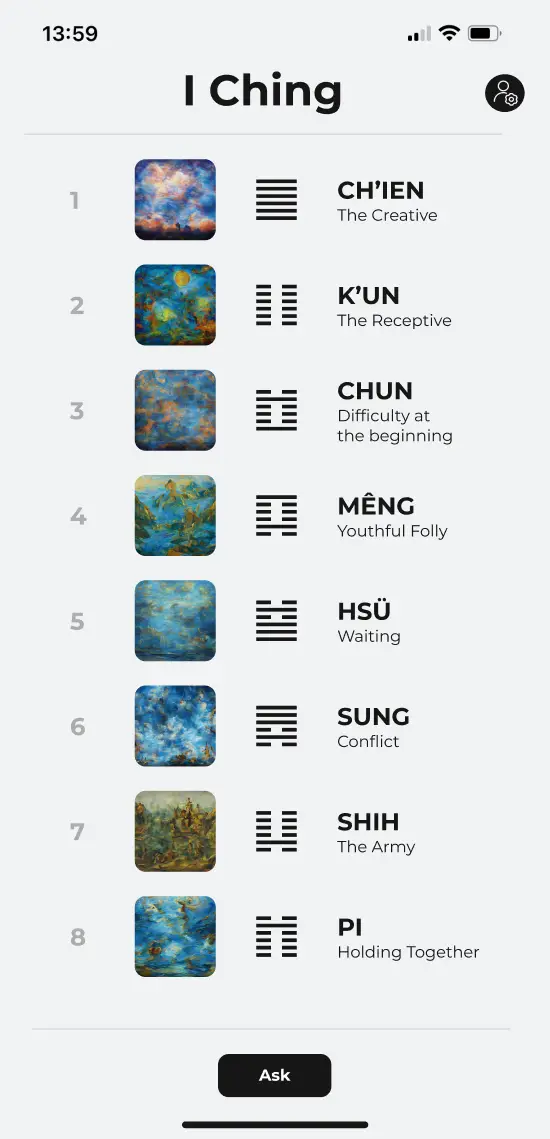
Water
Fire
Hexagram 63 - After Completion - CHI CHI
Warns against the danger of unbalancing thoughts and advises to remain vigilant against them. This is especially important when reconsidering important decisions or revisiting past experiences.
Summary
Hexagram 63 represents a state of completion and fulfilment after hard work and effort. The image of the hexagram is a lake above the earth, symbolising a state of stillness and tranquillity after the turmoil of the past. The key takeaways from the judgment and image of the hexagram are that it is time to let go of past efforts and enjoy the fruits of your labour.
Interpretation
Hexagram 63 advises remaining alert against bad influences, especially during success and improvement. After persevering through difficulties, it is natural to wonder if there is an easier way to proceed or if we have been too hard or too soft in our actions. However, indulging in unbalancing thoughts can lead to a resurgence of the ego and decay of our inner discipline. We should avoid complacency and continue to relate sincerely to each moment as it approaches, maintaining inner balance and staying grounded in our values and principles.
It is essential to be watchful of ourselves and others who inferior thoughts and actions may influence. Remaining vigilant can prevent misfortunes and prolong good fortune. The hexagram suggests letting go of attachment to outcomes and finding peace in the present moment. Celebrating our accomplishments and staying true to our principles and values are important aspects of success.
Hexagram 63 is a complex hexagram with many different themes and messages. At its core, it is a reminder that the journey to success is just as important as the destination. It encourages us to remain vigilant against complacency and to stay true to our principles and values. It also warns against the dangers of the ego and the tendency to become too attached to our accomplishments.
In addition, the hexagram emphasises the importance of discipline and self-control. It encourages us to remain vigilant against negative thoughts, attitudes, and actions in ourselves and others. This reminds us that our inner state is just as important as our outer circumstances and that we must be careful not to undermine our success through carelessness or complacency.
Overall, hexagram 63 encourages us to remain mindful and attentive to ourselves and the world around us. It reminds us that success is about achieving our goals and cultivating inner peace and contentment. We can achieve lasting success and fulfilment by staying true to our values and principles and remaining vigilant against negative influences.
Sage Advice
"After Completion" is to practice mindfulness and reflection, to celebrate what has been accomplished, and to be open to new opportunities while being cautious and preserving what has been established. This hexagram reminds us to appreciate the journey and lessons learned and to rest and contemplate before rushing into the next project or endeavour. It also encourages us to let go of the past and to be aware of potential challenges in the future while cultivating inner peace and mindfulness in the present. The ultimate goal is to maintain what has been accomplished and to be ready to adapt to any changes that may come our way.
Line 1
Warns against the dangers of recklessness and impatience, especially when we are in a position of pressure and stress. It is easy to become intoxicated by the possibility of success and to rush forward without carefully considering the consequences of our actions. The image of a fox crossing thawing ice emphasises the importance of caution and vigilance, even when we are making progress. It is important to recognise and respect the limitations of our situation and to proceed slowly and thoughtfully. By moving with patience and reserve, we can avoid the pitfalls of presumption and maintain our inner independence. In a broader sense, this hexagram reminds us that progress and success are not always linear or straightforward. There will be times when we face obstacles and setbacks, and it is important to approach these challenges with humility and a willingness to learn. Success is not just about achieving our goals but also about developing the inner strength and resilience to navigate through difficult times. By embracing a mindset of caution and reserve, we can stay true to our internal principles and values and avoid the traps of arrogance and impatience.
Line 2
This line warns against chasing after what we have lost due to our carelessness or negligence. Instead, we are advised to be patient and trust that what is lost will eventually be found, as represented by the woman who loses the curtain of her carriage and is told she will get it back on the seventh day. In a broader sense, this line speaks to the importance of letting go of attachment to outcomes and trusting the natural flow of events. It also suggests that we should not be overly concerned with the opinions and recognition of others but instead focus on our inner work and development. By cultivating a sense of modesty and acceptance, we can gain the strength and resilience to overcome obstacles and achieve our objectives, even in the face of setbacks and challenges. The image of the woman losing the curtain of her carriage can be seen as a reminder to let go of material attachments and focus on what is truly important in life.
Line 3
Cautions against the employment of inferior people and warns us not to let our inferior qualities take over. This can manifest as a "spoiled child" within ourselves, which tests the limits and boundaries we have set for ourselves. The I Ching advises that we must remain firm and maintain our emotional independence to subjugate and ultimately overcome our weaknesses. The I Ching suggests that we must resist this urge and stay conscious of our actions to avoid chaos and maintain our progress.
Line 4
We are warned of the danger of becoming complacent and allowing laxity to ruin our achievements. This can manifest as indulging in desire, allowing ambition to return, or becoming too comfortable with our progress instead of remaining strict and reserved. It is essential to resist the temptation to dwell nostalgically on the past or to become sympathetic to those who have not yet earned our trust. The image of the finest clothes turning to rags reminds us that even the most impressive accomplishments can quickly unravel if we let our guard down. It is crucial to remain vigilant and careful, especially when crossing treacherous waters or encountering difficult situations. Instead of dwelling on past injustices or debts owed to us, we should focus on moving forward and trust that the resolution of these matters will be handled by Fate. The fourth line teaches us the importance of maintaining a steady and disciplined approach to life, resisting temptation and remaining focused on our goals. We can navigate even the most challenging situations with diligence and perseverance and achieve lasting success.
Line 5
Reminds us that true greatness comes not from external magnificence or the flattery of others but from an inner sense of modesty, acceptance, and innocence. When we focus on correcting our errors and leading by example, we gain the respect and admiration of others genuinely and meaningfully. The image of the neighbour slaughtering an ox suggests that we can achieve true success and happiness through sacrifice and discipline rather than relying on external rewards or indulging in our egos. It reminds us to stay true to our values and principles, even in adversity or temptation.
Line 6
Amid success, it is essential to maintain sight of what is correct. The sixth line warns against the danger of getting too caught up in our achievements and becoming distracted, which can lead to mistakes and ultimately undo all that has been accomplished. To maintain good fortune, it is vital to remain focused on the path ahead and strive for what is right. This way, we can avoid slipping and falling in the face of success.








